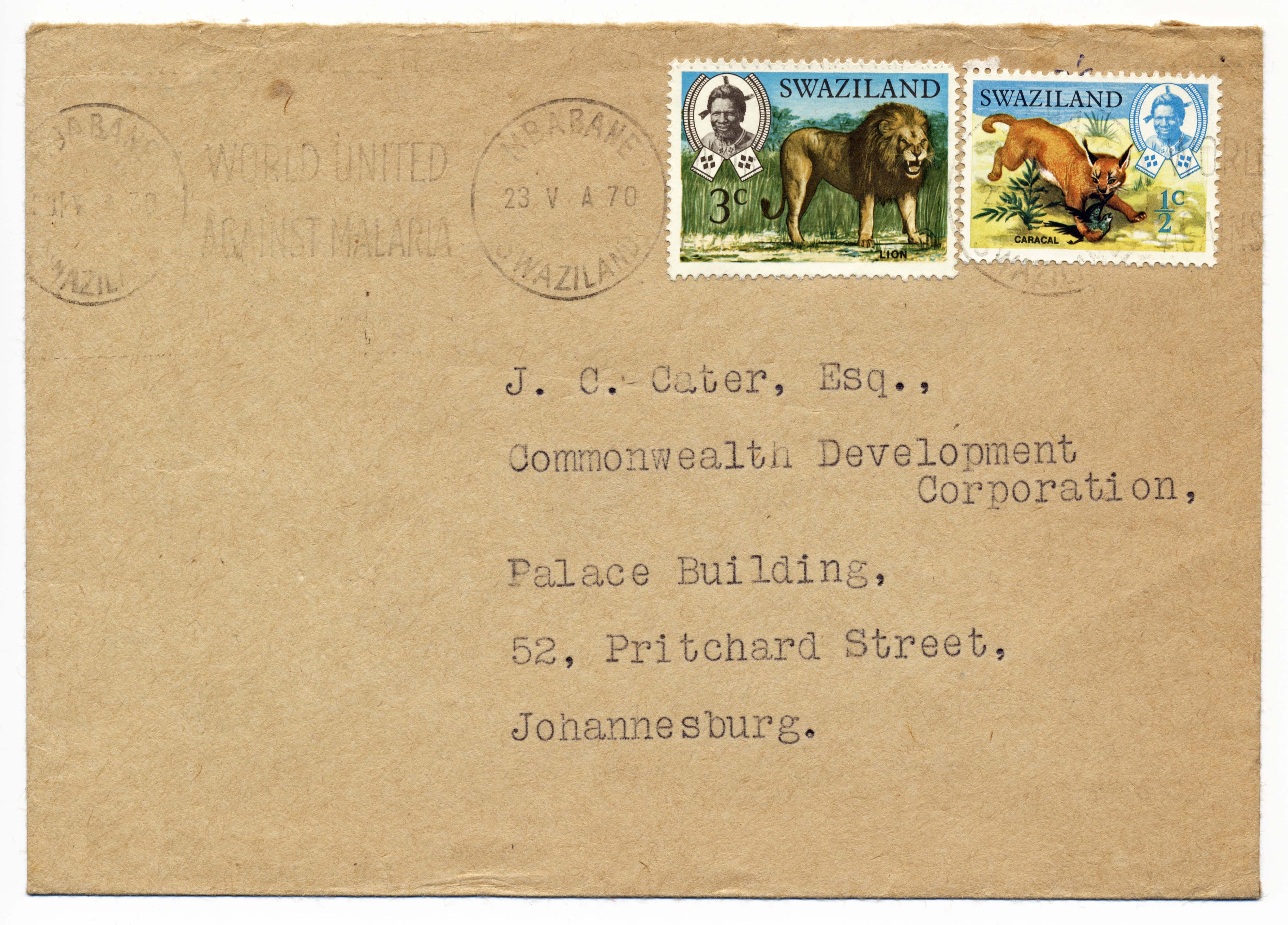World United Against Malaria Slogan Cancel Appears on 1970 Swaziland Letter
(Published: February, 2021, Volume 21, Number 1, Issue #52) (Table Of Contents)(Author: David Frye)
The early 1960s witnessed a global effort to combat malaria coordinated by the World Health Organization (WHO) under the heading of its "Malaria Eradication Programme" (WHO, 1962). This program received extensive publicity through the efforts of at least 117 postal administrations through their issuance of postage stamps and uses of special cancellations with designs that raised awareness of antimalarial efforts (Johnson and Fritz, 1963). With the passage of nearly five decades since this pervasive postal campaign, the documented list of countries that used slogan cancels to highlight the message of a "World United Against Malaria" has grown to twenty-five (Birrer, 2020a).
The covered reported here presents another use of a documented slogan cancel while confirming usage in a previously unreported year.
Mbabane Slogan Cancel
Swaziland, a British protectorate until its independence in 1968, used "World United Against Malaria" slogan cancels on mail postmarked in Manzini and Mbabane (Birrer, 2020b). The roller-cancel postmark identified 'rrer's work through the Malaria Philatelists International (MPI) and the postmark on the Mbabane-Johannesburg letter depicted in Fig. 1, above, match. At first glance, the slogan seems to sit to the left of the circular date stamp (CDS), but faint traces of the slogan text appear in the white space within the design of the 3c postage stamp. The partial left-hand CDS shows some compression along its horizontal axis. This artifact of the passage of the roller canceller across the surface of the envelope may explain why the full CDS in the middle of the envelope measures 25.0 mm x 26.5 mm rather than 26.5 mm along both axes, the dimensions reported in the MPI reference.
Birrer notes that the earliest and latest reported uses occurred on 2 May 1962 and 12 July 1974, respectively. This cover, dated 23 May 1970, falls within this period. Birrer comments that no known uses have dates in the years from 1966 to 1970. Thus, this envelope supports changing that interval of absence to 1966-1969.
ConclusionThis letter, posted in Mbabane, Swaziland, by an unknown sender, arrived in the mailbox of J.C. Cater, Johannesburg, bearing a clearly marked announcement of a global goal of banding together people and nations to combat a preventable disease. Its mailing date enables one to refine the documented windows of nonusage and usage, moving 1970 from the former to the latter. Such slogan cancels serve as reminders of the historical efforts to use both stamps and postmarks to promote worthy goals. The widespread employment of such slogan cancels over long periods suggests that current efforts to combat other diseases would benefit from the support of similar postal promotions that employ the mail as a medium of social communication.
References- Mike Birrer, ed., "Malaria Philatelists International, Handbook of Malaria Philately", accessed 21 July 2020.
- Mike Birrer, ed., Malaria Philatelists International, Handbook of Malaria Philately, "Slogan Cancel: Swaziland, 1962", accessed 21 July 2020.
- Donald R. Johnson and Roy F. Fitz, "Postage Stamps Portray a World United Against Malaria", World Health Organization, 30 August 1963, accessed 21 July 2020.
- World Health Organization, Executive Board, "Development of the malaria eradication programme", EB29.R11, accessed 21 July 2020.
David M. Frye collects items to inform his study of modern United States postal history and southern and eastern Africa's post-colonial postal history. His writings have appeared in The Airpost Journal, Auxiliary Markings, B.E.A.-The Bulletin of the East Africa Study Circle, Forerunners, The Journal of the Rhodesian Study Circle, The Miasma Philatelist, Postal History Journal, The Postal Label Bulletin, The Stamp Forum Newsletter, The United States Specialist, Vatican Notes, and The Vermont Philatelist. A past member of the Board of Directors of the Postal History Society, he lives in Franklin, Massachusetts, and works in nearby Framingham as a clerk for the U.S. Postal Service.

